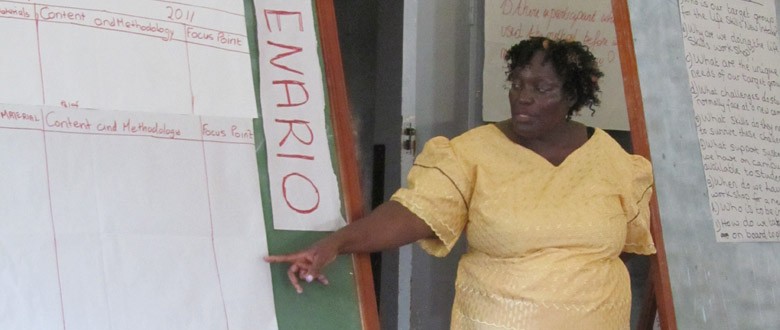
Throughout all the support given to the colleges by the VVOB team, there is a conscious choice to use participatory methodologies, exposing partners in the colleges to alternative teaching and learning methodologies.
How student-centred learning methodologies used in the programme had an immediate impact…
“’Why am I stigmatised?’, asked the poet. ‘Because I am poor? Because I am ill? Because I don’t fit your expectations? Because I don’t fit this college’s mode?’ The silence in the hall was deafening. His heart-rending poem came after a powerful student drama on discrimination in class and seemed to drive the point home. Raising awareness about stigmatisation and discrimination was the theme of this special assembly and the result of a lot of hard work by the peer educators club.
Given the resistance to forming a support group for HIV positive people at my college, this assembly was nothing short of astounding. With a high level of mistrust and fear of repercussions, lecturers and students alike were not prepared to disclose their status. A way forward had to be found.
So we, the steering committee, organised a workshop for students. For two days participants questioned stigma and discrimination. The atmosphere was relaxed. Everyone was a learner and everyone had something to share. Where was all the joy coming from? Everyone was free to participate and give answers without fear of judgement. The students found that they could listen carefully to other people’s stories and learn ways of coping from them. We spent time tackling negative attitudes that lead to discrimination. Some students displayed talents in art, some in song and dance, and some in communicating group feedback. Some were brilliant in acting out situations where discrimination happens and showing how it could be reduced. We all came to see how discrimination is often the result of poor information and lack of understanding.
Most students said: ’We need to understand people with different cultures and situations to those we are familiar and comfortable with. We need to take time to empathise rather than rushing to judge.’ Ideas for how the peer educators club could tackle these issues on campus were discussed and plans made for the months ahead, beginning with an awareness-raising assembly.”
Mrs. Placidia Kasere, Lecturer in Charge, Health and Lifeskills Department, Morgan Zintec Zimbabwe
Teacher training colleges and VVOB have a unique relationship: Unlike many other development programmes, the colleges identify the need and communicate it to the VVOB team to engage them in co-planning an intervention workshop. Not the other way around.
Behind the scenes of the story told above, the college team called on the VVOB support team to join them in reviewing their plans and a detailed workshop scenario they had prepared. Frank and constructive comments were given in even more meetings until a refined scenario was agreed upon. The lecturers who volunteered to facilitate the workshop scenario mapped out who would do what and rehearsed their parts. The strength of this approach lies in the learning that happens. The facilitators each clarify the issues to himself or herself and between themselves as a team, then help the students learn as they take part in the workshop’s many participatory activities.
"If you want the teacher to be caring towards the children and to create a caring environment, the student teacher needs to become caring.
Therefore the lecturer needs to be a role model of care towards the student teacher and try to create a caring environment at the college.
Management, in turn, can play a role in providing a safe environment for the lecturers."
Mrs. Beate Chikwanda, former College Lecturer and VVOB team member, Zimbabwe




